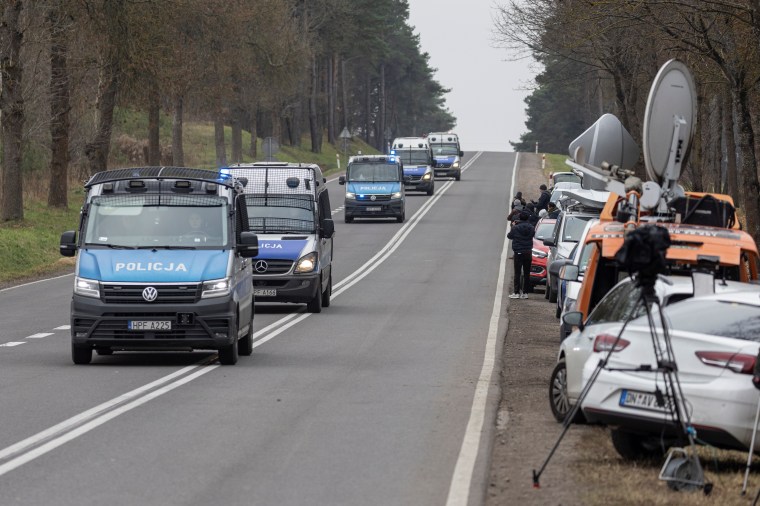Berlin, November 23, 2021 — Polish authorities should allow journalists to cover refugee movements and other events of public interest without interference, the Committee to Protect Journalists said today.
Since November 14, Polish police, border guards, and soldiers have detained and obstructed at least seven journalists covering refugee movements near the country’s border with Belarus, according to news reports and journalists who spoke with CPJ.
Belarus authorities have recently allowed at least 3,000 asylum seekers from the Middle East to pass through the country to the border with Poland, sparking a diplomatic confrontation between the two countries, according to news reports.
“Polish authorities must allow reporters covering refugee movements to work freely, especially in border areas,” said Gulnoza Said, CPJ’s Europe and Central Asia program coordinator, in New York. “If police detain, harass, or obstruct journalists, they are depriving the Polish people and the rest of the world of vital information regarding an issue of global importance.”
On November 14, police and border guards near the northeastern village of Czeremcha stopped reporter Claudia Ciobanu and photojournalist Jaap Arriens, both with the Balkan Investigative Reporting Network and regional news website Balkan Insight, and held them for about 30 minutes, according to Balkan Insight and Ciobanu, who spoke with CPJ via messaging app.
The officers demanded that the journalists disclose their phones’ serial numbers, and when Ciobanu and Arriens asked why, the officers said they were suspected of having stolen the phones, according to those sources.
The officers released the journalists without charge, but only after accusing them of illegally entering Poland’s state of emergency area, and saying they could face criminal charges and up to 48 hours of detention for doing so, Ciobanu told CPJ.
In September, Polish authorities declared a state of emergency covering the border area with Belarus, and barred journalists from entering that zone, as CPJ documented at the time. Ciobanu denied having entered the prohibited area.
On November 15, police in the village of Usnarz Gorny detained and questioned reporter David Khalifa and camera operator Jordi Demory, both with the Russian government-funded network RT France, as they were documenting refugee movements, according to a report by their employer, news reports, and tweets by Khalifa.
Authorities held Khalifa and Demory for several hours and took them to a court in the city of Sokolka, where they were fined for allegedly working in the emergency zone, banned from reentering that zone, and then released, according to those sources.
RT France’s report did not disclose the amount of the fine; CPJ emailed the broadcaster for comment but did not receive any reply.
On November 16, in the outskirts of the northeastern village of Wiejki, outside of the emergency zone, a group of soldiers stopped a car carrying photojournalists Maciej Nabrdalik, a freelancer; Maciej Moskwa, with the Polish media collective Testigo; and Martin Divíšek, with the European Pressphoto Agency, according to Nabrdalik, who spoke to CPJ in a phone interview, and reports by the Polish Press Club professional organization and Press.pl trade website.
Nabrdalik told CPJ that the three introduced themselves to the soldiers as journalists, said they would take photos, and the soldiers did not protest. However, when he, Moskwa, and Divíšek started to leave the scene, the soldiers abruptly stopped them, Nabrdalik said.
The soldiers forcibly pulled the three journalists out of their car, handcuffed them, and held them for about an hour while they searched their car and examined their cameras and cellphones, according to Nabrdalik and those reports. The soldiers were not able to unlock the journalists’ phones, but reviewed and took notes on the phone numbers and other information displayed on their locked screens, those reports said.
The Polish Press Club’s report features photos of bruises on the journalists’ wrists caused by the handcuffs.
In a statement published on Twitter, the Polish Ministry of Defense alleged that Nabrdalik, Moskwa, and Divíšek did not identify themselves as journalists and attempted to flee the scene, and that the soldiers detained them until police could arrive. However, Press.pl wrote in its report that the outlet had reviewed an audio recording taken during the incident, which confirmed that the journalists identified themselves as members of the press, and the soldiers cursed at them and could be heard demanding to review their photos.
In a November 20 interview with the Polish radio station RMF, Defense Minister Mariusz Błaszczak praised the soldiers’ behavior in the encounter, saying, “it is their duty to be firm.”
CPJ emailed the press departments of the Ministry of the Interior, which oversees the police and the border guard, and the Ministry of Defense, for comment, but did not receive any replies.
